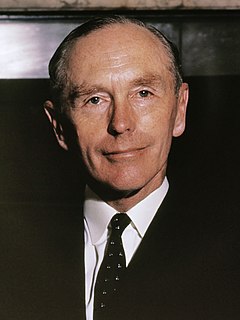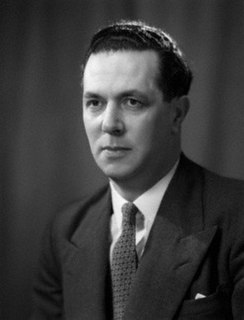
Kenneth Harry Clarke, often known as Ken Clarke, is a British Conservative politician who has been the Member of Parliament for Rushcliffe since 1970. He is currently the Father of the House.
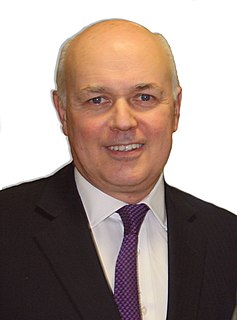
The 2001 Conservative Party leadership election was held after the British Conservative Party failed to make inroads into the Labour government's lead in the 2001 general election. Party leader William Hague resigned, and a leadership contest was called under new rules Hague had introduced. Five candidates stepped forward: Michael Ancram, David Davis, Kenneth Clarke, Iain Duncan Smith and Michael Portillo.

Peter David Shore, Baron Shore of Stepney, PC was a British Labour politician and former Cabinet Minister, noted in part for his opposition to the United Kingdom's entry into the European Economic Community. His idiosyncratic left-wing nationalism led to comparison with the French politician Jean-Pierre Chevènement. He was described in an obituary by the Conservative journalist Patrick Cosgrave as "Between Harold Wilson and Tony Blair, the only possible Labour Party leader of whom a Conservative leader had cause to walk in fear" and, along with Enoch Powell, "the most captivating rhetorician of the age".

First Among Equals is a 1984 novel by British author Jeffrey Archer, which follows the careers and personal lives of four fictional British politicians from 1964 to 1991, with each vying to become Prime Minister. Several situations in the novel are drawn from Archer's own early political career in the British House of Commons, and the fictional characters interact with actual political figures from the UK and elsewhere including Winston Churchill, Alec Douglas-Home, Harold Wilson, Edward Heath, Margaret Thatcher, Douglas Hurd, Muammar al-Gaddafi, Gary Hart and Queen Elizabeth II.

The 2005 Conservative Party leadership election was called by party leader Michael Howard on 6 May 2005, when he announced that he would be stepping down as Leader of the Conservative Party in the near future. However, he stated that he would not depart until a review of the rules for the leadership election had been conducted, given the high level of dissatisfaction with the current system. Ultimately, no changes were made and the election proceeded with the existing rules, which were introduced in 1998.
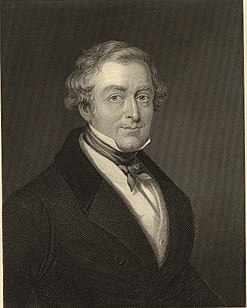
The Conservative Party is the oldest political party in the United Kingdom and arguably the world. The current party was first organised in the 1830s and the name "Conservative" was officially adopted, but the party is still often referred to as the Tory party. The Tories had been a coalition that more often than not formed the government from 1760 until the Reform Act 1832. Modernising reformers said the traditionalistic party of "Throne, Altar and Cottage" was obsolete, but in the face of an expanding electorate 1830s–1860s it held its strength among royalists, devout Anglicans and landlords and their tenants.

John Wynne William Peyton, Baron Peyton of Yeovil, was a British politician. He was Conservative Member of Parliament for Yeovil for 32 years, from 1951 to 1983, and an early and leading member of the Conservative Monday Club. He served as Minister of Transport from 1970 to 1974. He was a candidate for leader of the Conservative Party in 1975, losing to Margaret Thatcher.

The 1990 Conservative Party leadership election in the United Kingdom took place on 20 November 1990 following the decision of Michael Heseltine, former Defence and Environment Secretary, to challenge Margaret Thatcher, the incumbent Prime Minister, for leadership of the Conservative Party.

The 1995 Conservative Party leadership election was initiated when the incumbent leader and Prime Minister, John Major, resigned as leader on 22 June 1995, in order to face his critics within the party. On 4 July 1995, he was re-elected, beating the only other candidate, the former Secretary of State for Wales, John Redwood.

The 1965 Conservative Party leadership election was held in July 1965 to find a successor to Sir Alec Douglas-Home.
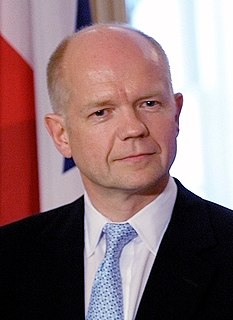
The 1997 Conservative Party leadership election was triggered in the British Conservative Party when John Major resigned on 2 May 1997, following his party's landslide defeat at the 1997 general election, which ended 18 years of Conservative Government of the United Kingdom. Major had been Conservative leader and Prime Minister since November 1990.
Francis Nigel Forman, known as Nigel Forman, was a British Conservative politician. After working in the Conservative Research Department from 1968 to 1976 he was elected as an MP. He became a prominent backbench MP and was appointed to the position of Minister of Higher Education in April 1992. In December 1992 he resigned from this post "for personal reasons".
Sir William Jeremy Masefield Shelton was a Conservative Party politician in the United Kingdom. He was Member of Parliament for Clapham from 1970 to February 1974, then for Streatham from February 1974 until he lost the seat to Labour Party candidate Keith Hill in 1992.
Tory! Tory! Tory! is a 2006 BBC television documentary series on the history of the people and ideas that formed Thatcherism told through the eyes of those on the New Right. It was nominated for the best Historical Documentary at the Grierson Awards in 2006.
The Commons members of the Parliamentary Labour Party (PLP) elected 19 members of the Shadow Cabinet from among their number in 2010. This follows the Labour Party's defeat in the 2010 general election, after which the party formed the Official Opposition in the United Kingdom.
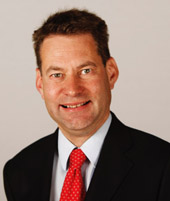
The 2011 Scottish Conservative Party leadership election was an internal party election to elect a new leader of the Scottish Conservative and Unionist Party, the third largest political party in the devolved Scottish Parliament. Ruth Davidson was declared the winner of the contest on 4 November 2011, succeeding former leader Annabel Goldie. The election was triggered when incumbent party leader Annabel Goldie announced her resignation on 9 May 2011, following her party's self-described 'disappointing' result in the 2011 Scottish Parliament election, in which the Conservatives were reduced from 17 seats to 15.
Margaret Thatcher became the first female Leader of the Conservative Party and Leader of the Opposition after winning the 1975 leadership election, the first Conservative leadership election where the post was not vacant. A rule change to enable the election was largely prompted by dissatisfaction with the incumbent leader, Edward Heath, who had lost three of four general elections as leader, including two in 1974. After announcing her first Shadow Cabinet in February 1975, she reshuffled it twice: in January and November 1976. Minor subsequent changes were necessary to respond to various circumstances. Thatcher's Shadow Cabinet ceased to exist upon her becoming Prime Minister following the 1979 general election.

The 2016 Labour Party leadership election was called when a challenge to Jeremy Corbyn as Leader of the Labour Party arose following criticism of his approach to the Remain campaign in the referendum on membership of the European Union and questions about his leadership of the party.










